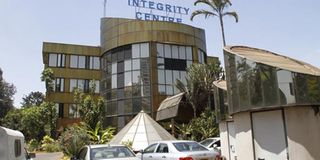It is time to declare total war on corruption

The building that houses the Ethics and Anti-Corruption Commission in Nairobi. A few years ago in America, two things happened that could be of significance to how we handle our burden of corruption. FILE PHOTO | JEFF ANGOTE |
What you need to know:
- In later decades, Kenyan wealth was systematically looted by conniving interests in political partnerships.
- Kenyans have over the years seen scandals of mega proportions come and go — Goldenberg, Ango Leasing, the maize scam, and election disputes. Sadly, our criminal and justice systems have failed to conclusively deal with any of them, encouraging their recurrence.
- It is naive of us to expect to achieve the goals of Vision 2030 when our national institutions, which are instrumental in attaining these objectives, cannot be trusted and have lost their credibility.
A few years ago in America, two things happened that could be of significance to how we handle our burden of corruption.
First, America’s economy was grappling with the effects of recession from the Bush years and the new administration of Barack Obama had to work hard to restore the economy.
In the wake of the instability, a major war was being waged. The US government declared war on banks and other institutions whose shady dealings had led to the crisis in the housing and other sectors.
Financial giants such as WorldCom and Enron went under due to mismanagement, forcing the Bush administration to enact the Sarbanese-Oxley Act to rein in institutional corruption.
Those who were responsible for fraud, such as business mogul Bernard Madoff, were prosecuted. In other words, it was payback time and America did not entertain any sacred cows when it resolved to slay the dragon of corruption.
It is time the Kenyan authorities stopped procrastinating about corruption, which is deeply engrained in our society and must be exorcised without any remorse. The fact that even the Ethics and Anti-Corruption Commission and Parliament are embroiled in this conundrum should worry us.
Although people generally consider corruption as simply embezzlement of public funds, it is, in reality, a maze of dishonesty that affects the operations of the government and private enterprises.
Kenyans have over the years seen scandals of mega proportions come and go — Goldenberg, Ango Leasing, the maize scam, and election disputes. Sadly, our criminal and justice systems have failed to conclusively deal with any of them, encouraging their recurrence.
This inaction has bred a feeling of helplessness among Kenyans of integrity, who form the majority of the citizenry, as they watch the image of their nation become irredeemably tarnished by a few selfish individuals.
We have failed to win the war on corruption because of lack of leadership and political will to confront the deep-rooted networks that have outlived successive governments. In the early 1980s, it was the corrupt cartels overseeing the smuggling of coffee.
SYSTEMATICALLY LOOTED
In later decades, Kenyan wealth was systematically looted by conniving interests in political partnerships.
It is not too late to fight this vice. We need to re-examine ourselves. Only after we accept that we have sunk to ignominious depths will we have the courage and resolve to redirect the course of our destiny by confronting the cancer of corruption.
It is very well for the President to issue warnings to those who have stolen from public coffers, but what is required in this situation is more than just words. Tough action must be taken to halt the haemorrhaging of public resources in both the county and national governments.
It is naive of us to expect to achieve the goals of Vision 2030 when our national institutions, which are instrumental in attaining these objectives, cannot be trusted and have lost their credibility.
It is illusionary to expect national transformation without efficient public delivery systems and good governance.
There is no worse existential threat to a developing nation than corruption. All that social ills, including terrorism, need to flourish is an environment where corruption thrives.
Mr Wato is a political commentator from Marsabit County. [email protected]





